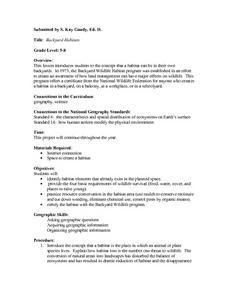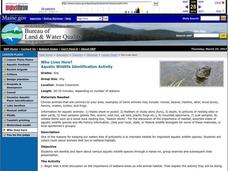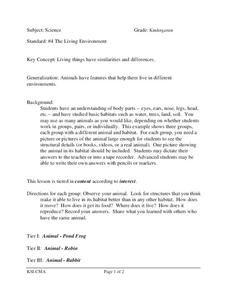ARKive
Adaptations for Movement
What animals are best suited for moving around a rainforest, or a desert? Design your own animal species based on a particular habitat, focusing on the characteristics it will need for optimal movement. Great as a group lesson or...
PBS
Reading Adventure Pack: Oceans
Flotsam by David Wiesner and The Magic School Bus on the Ocean Floor by Joanna Cole, illustrated by Bruce Degen, begin a reading adventure pack focusing on oceans. With story listening and thoughtful discussion, scholars complete several...
Alabama Wildlife Federation
Life in a Pond
What living things call an aquatic habitat home? Young learners consider the question after they discuss the characteristics of a typical pond habitat. They identify an animal and then determine if a pond would have all the components to...
Curated OER
Habitats
First graders investigate animal habitats. In this habitats lesson, 1st graders visit the woods to identify examples of food, water, and shelter that animals use to survive. Students complete a worksheet.
Curated OER
Animal Habitats Cut and Paste
In this animal homes worksheet, students cut out 6 pictures of animals and paste them under the appropriate habitat: water or land.
Curated OER
Backyard Habitats
Students identify habitat elements. They create a habitat in a backyard, on a balcony, at a workplace, or in a schoolyard and provide the four basic requirements of wildlife survival (food, water, cover, and places to raise young). They...
Curated OER
A Matter of Survival
Fourth graders dance with inspiration from wild animals. In this creative movement lesson, 4th graders watch a video clip and then move like an animal might move in their natural surroundings.
National Wildlife Federation
What's Your Habitat?
How do human habitats compare to animal habitats? Individuals begin their nature discovery by drawing their own habitats that extend beyond their houses. Pupils ensure their drawings include the four habitat elements of food, water,...
Howard Hughes Medical Institute
Ocean Acidification
Human impacts on the environment can sometimes be difficult to measure, especially under water! An activity centered on ocean acidification gives science scholars the opportunity to examine the effects of carbon dioxide on marine life....
Curated OER
Who Lives Here?
Students identify various aquatic wildlife species. In this biology lesson students collect clues about animals that live in wetland habitats. Students rotate through several stations displaying particular animal species to collect their...
Curated OER
Habitat is Home
Students complete a picture to show things found in their homes. For this habitat lesson, students discuss and make a class picture of an animal habitat and its four basic needs. Students sing a song. Students create their...
Curated OER
Wildlife
First, biology pupils research land and marine habitats along the route of skipper Rich Wilson's Great American II. Then, using colored paper clips scattered across a colored paper background, they play the predator-prey game to...
Curated OER
Flutterings and Flowers
Fourth graders investigate the significance of natural resources and the habitats of butterflies. They create a list of their own favorite foods, then watch a video about habitats. Students identify things in the video that animals and...
Curated OER
Aquatic Science
What a terrific way to explore the pond habitat! Learners discuss the animal and plant life found in the Long Island area. They also discuss vocabulary terms, identify pollution concerns, and resource conservation.
Curated OER
Regents High School Examination: Living Environment 2003
The living environment, from the interior of a cell to the complex relationships among populations, are queried in this final examination. Learners look at air pollution maps, diagrams of cells, population graphs, and drawing of cells....
Curated OER
Freddy the Fish
Students complete an experiment. In this water pollution instructional activity, students brainstorm information about river habitats and water pollution. Students then read the story Freddy the Fish and complete an experiment...
Curated OER
The Living Environment
Students investigate animals and their environments. In this animal similarities and differences activity, students explore animal adaptations and features and their habitats. Students get into groups to discuss the habitat and how...
Curated OER
"Habitats"
Students complete a unit of lessons on animals and animal conservation. They observe a square meter of ground outside the school, set up a model environment, analyze an owl pellet, grow bread mold, and explore various websites.
Curated OER
Water: H2O = Life
In this earth science worksheet, students explore and describe animals and their adaptations, including their habitats, physical characteristics, and competing organisms. They also explore and describe how others use water around the...
Curated OER
Habitats of the World
Students complete a unit of eighteen lessons that cover climate, geography, location, plants, and animals of each of the five habitats. They are also introduced to habitat destruction and discuss ways to protect the environment. They do...
National Wildlife Federation
What's Your Habitat?
How are third graders like rabbits? They both live in habitats and require food, water, and shelter to survive! An educational science activity encourages your learners to think about their own habitats and survival needs, before...
NOAA
A Matter of Density
Larvae transportation on the New England seamounts is based on the density of the water. Scholars calculate density and graph salinity versus temperature to better understand the distribution of organisms in a water column....
WolfQuest
The Return of Gray Wolves to Yellowstone National Park: Right or Wrong?
Should gray wolves be removed from Yellowstone National Park? After researching the complex relationships between the various habitats and species at Yellowstone National Park, including humans, class members take a position...
American Museum of Natural History
Ask a Scientist About Our Environment
Let's ask an expert! Scientists at the American Museum of Natural History field questions about the environment in an interactive resource. Question topics range from global warming and conservation to endangered species and habitats.

























